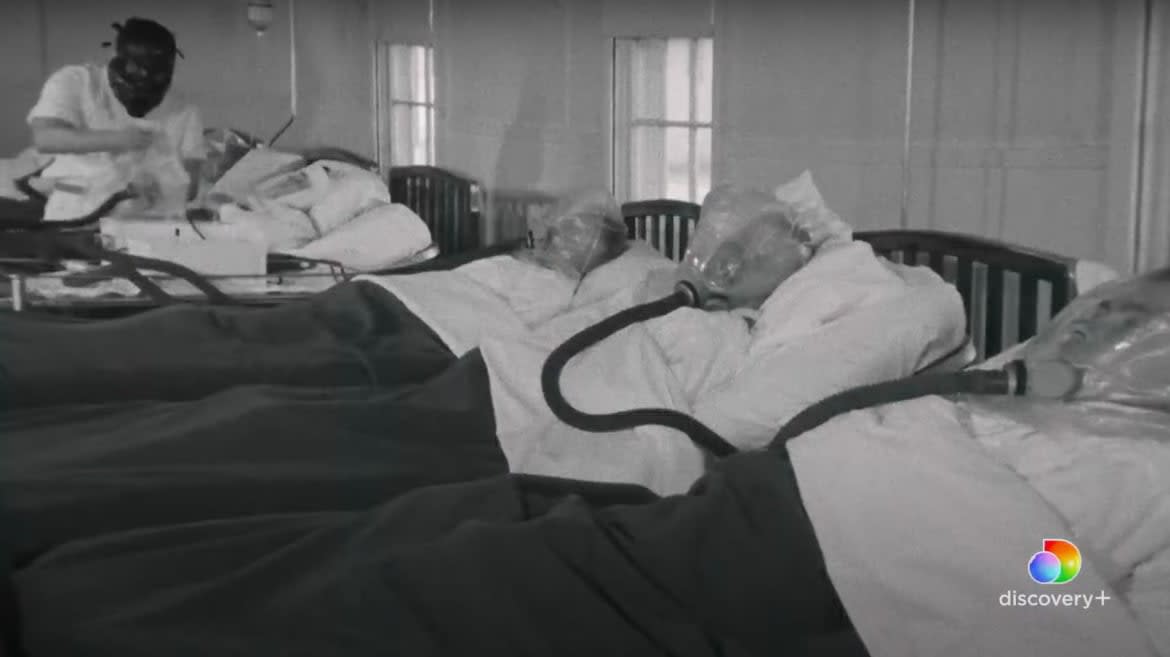Did the U.S. Army Use Nazi Scientists to Test Chemical Weapons on Soldiers?

For decades, a select handful of veterans from the U.S. military have been forced to remain quiet about a terribly gruesome set of human experiments conducted during the Cold War. They’ve faced a horrifying Catch-22: If they speak, they break their confidentiality code and will no longer receive veteran benefits. If they keep quiet, they won’t be able to get the medical help required to treat the lingering mental damage caused them.
Heading to Discovery+ this week, Dr. Delirium & The Edgewood Experiments unpacks the human testing that was allegedly executed at Edgewood Arsenal from 1955 to 1975. While hearing from the vets who participated in the program is a completely harrowing experience, the most damning part of the doc is a never-before-seen interview with Edgewood’s lead research director, Dr. James Ketchum.
The goal of Edgewood was to find a mind-altering, non-lethal drug to impair U.S. enemies. Using a group of soldiers who had volunteered, Dr. James Ketchum and other directors tested LSD, marijuana, and, the most cruel, BZ (put plainly in the doc, “a bad trip,” unlike anything you’d find on the street today) on unknowing patients. Though they had an idea of what they were signing up for, the vets say they were lured into the project with no guard duty and every weekend off.
“We were guinea pigs,” says veteran Gene Capogerri, who took part in the Edgewood trials of 1965. As Capogerri speaks of his experience, we see old footage of him shaking around as he’s forced to take LSD through a gas mask. “I remember this clear as could be. All I heard was the doctors that were standing around: ‘Turn it off! Turn it off! Turn it off!’ Because it was too much.”
Can American Troops Win Wars by Dropping Acid?
This idea of developing chemical warfare stemmed from the idea that Russia was working on chemical agents, far ahead of the U.S. in developing their weapons. This was false, but that didn’t stop the U.S. from continuing to test on soldiers. After LSD, which “didn’t cause a total inability of function,” Edgewood arsenal switched to quinuclidinyl benzilate—aka BZ.
“BZ caused a real kaleidoscope of effects: scattered function and thinking, alteration and perception that is prominent in delirium,” Dr. Ketchum explains. “BZ was the chemical of choice, and I built the program around that.”
While BZ might have been the best in chemical warfare, it had a clear torturous effect on soldiers. The volunteers would sit in delirium for hours—days—on end, trapped in a cell and tormented by hallucinations for upwards of 36 hours. “There wasn’t that much left of me by the time they got done with me,” a vet says.
Decades later, these vets still face PTSD thanks to the drugs forced upon them at Edgewood Arsenal. One vet says he can’t sleep at night, chasing his wife out of bed nearly every time they try to share a room together. Hallucinations still work their way into his head.
Perhaps this could be solved—or if not solved, soothed, at the very least—by some medical attention, which the military is supposed to provide for all of its vets after their service. Alas, that won’t work. These volunteers were sworn to a secrecy oath that lasts 50 years after their service. If they break that, they’ll lose all their military benefits. (Luckily, by the end of the doc, they find a loophole involving the CIA and get the help required.)
Why Scientists Invented a Magic Mushroom That Has No Magic
The mental health effects are the worst of it, but there’s another dark aspect of Edgewood Arsenal: the U.S. employed eight ex-Nazi scientists to help with their testing. Per the doc’s findings, these were Hitler’s favorite chemists in Germany, and the U.S. referred to them as “German talent.” Edgewood even implemented the use of real gas chambers to test out chemicals.
“They were no real Nazis,” Ketchum grossly defended. “They had to do what they were told back in Europe. Although, there were a couple people that were in the chemical branch of the larger clinical research department that took place in these other buildings.”
Ultimately, the doc accuses the U.S. military of violating the Nuremberg Codes, a set of rules established after the gruesome human chemistry of the Holocaust. Under Ketchum, volunteers weren’t told what drugs they were given, nor the side effects that could occur. Further, the scientist in charge was required to shut down the experiment should they believe any parts of the experiment would lead to injury, disability, or death.
As the vets of the Edgewood Arsenal experiments come together to discuss the aftermath, it’s clear to see that these trials certainly had a lasting negative impact on their health. Though the government continues to shelter what actually happened at Edgewood—they even fudge paperwork sent to one vet, erasing part of his volunteer form when requested for trial—Dr. Delirium & The Edgewood Experiments shows the extreme effects of human testing.
Dr. Delirium & The Edgewood Experiments will debut on Discovery+ on June 9.
Get the Daily Beast's biggest scoops and scandals delivered right to your inbox. Sign up now.
Stay informed and gain unlimited access to the Daily Beast's unmatched reporting. Subscribe now.

